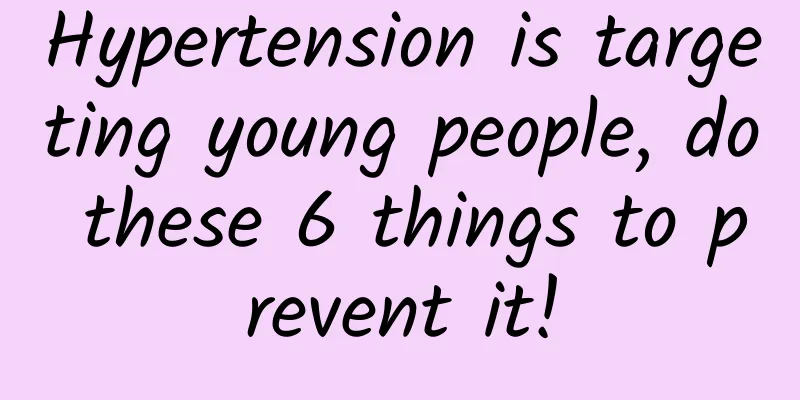Hypertension is targeting young people, do these 6 things to prevent it!

|
Hypertension is targeting young people, do these 6 things to prevent it! Hypertension is one of the most common chronic diseases. In the prevention and control of chronic diseases, hypertension prevention and control is of vital importance. There are currently about 270 million patients in my country. Deaths caused by cardiovascular and cerebrovascular diseases in my country account for more than 40% of total deaths. 70% of stroke deaths and 50% of myocardial infarctions are closely related to hypertension. Hypertension is the most important risk factor for the onset and death of heart disease, stroke, kidney disease, etc. The most important measures to prevent and control high blood pressure are to lead a healthy lifestyle, detect high blood pressure, control high blood pressure, and manage high blood pressure. Preventing high blood pressure starts every day. Six steps to a healthy lifestyle: Limit salt intake, lose weight, exercise more, quit smoking and drinking, keep a calm mind 1. Limit sodium salt intake: Excessive sodium salt intake increases the risk of high blood pressure. Long-term salt restriction can slow down the rate at which blood pressure rises with age. The average salt intake of Chinese residents exceeds 9g/day. The World Health Organization recommends that the salt intake per person should not exceed 5g/day. It is recommended to replace ordinary salt with low-sodium salt. 2. Lose weight: Overweight and obesity can lead to high blood pressure and increase the risk of hypertension. Abdominal obesity may have a stronger correlation with hypertension. It is recommended that overweight and obese people lose weight and keep waist circumference less than 90cm for men and less than 80cm for women. 3. Moderate exercise: Exercise can reduce sympathetic nerve activity, relieve tension, reduce weight, and reduce the risk of hypertension. It is recommended to perform at least 150 minutes of moderate-intensity aerobic exercise (such as brisk walking, jogging, swimming or cycling) per week according to your own conditions, and perform appropriate muscle strength and flexibility exercises. 4. Quit smoking: Smoking can increase the risk of cardiovascular and cerebrovascular diseases. It is recommended to quit smoking (including traditional cigarettes and e-cigarettes). 5. Quit drinking: Drinking a lot of alcohol raises blood pressure, and not drinking is the best for health. It is recommended that patients with hypertension not drink alcohol. Patients with hypertension who are currently drinking alcohol are advised to quit drinking. 6. Maintain psychological balance: Long-term mental stress, anxiety, and depression can increase the risk of hypertension. You should maintain a positive and optimistic attitude and avoid negative emotions. Actively accept psychological intervention when necessary. If your blood pressure exceeds 130/80 mmHg, you should start paying attention 1. If blood pressure exceeds 140/90 mmHg three times on different days without using antihypertensive drugs, it can be diagnosed as hypertension and lifestyle intervention and drug treatment can be started. 2. Blood pressure above 130/80 mmHg should be a cause for concern. As blood pressure rises, it may cause harm to organs such as the heart, brain, and kidneys. Lifestyle intervention should be started early, and antihypertensive drug treatment should be started as early as possible for patients who have already developed target organ damage and cardiovascular and cerebrovascular complications. Control high blood pressure and protect the heart, brain and kidneys 1. The main harm of hypertension is that it can damage important organs such as the heart, brain, and kidneys, and can even be life-threatening, so active treatment should be taken to control blood pressure. Treatment strategies include a healthy lifestyle and drug therapy. 2. All patients should adhere to a healthy lifestyle. Healthy lifestyle intervention can effectively lower blood pressure or directly reduce the risk of cardiovascular and cerebrovascular diseases. 3. Hypertensive patients whose blood pressure cannot reach the target level with lifestyle intervention alone should actively receive antihypertensive drug treatment. Steady blood pressure reduction, long-term compliance 1. Hypertensive patients should take medication for a long time and are encouraged to choose long-acting antihypertensive drugs that can be taken once a day to ensure stable blood pressure reduction. For patients who need combined antihypertensive drug treatment, it is recommended to give priority to single-tablet compound preparations. 2. Blood pressure target standard: For patients with general hypertension, blood pressure should be reduced to below 140/90 mmHg. For patients with diabetes, coronary heart disease, heart failure or chronic kidney disease with proteinuria, blood pressure should be controlled below 130/80 mmHg. For patients aged 65 to 79, blood pressure should be reduced to below 140/90 mmHg. If tolerated, it can be further reduced to below 130/80 mmHg. For elderly patients aged 80 and above, blood pressure can be controlled to below 140/90 mmHg. |
>>: Understand dental bacteria and protect your oral health
Recommend
How long does it take to get pregnant?
Preparing for pregnancy is a normal process for c...
Pregnancy line on legs
Many pregnant women have various pregnancy reacti...
What to do if you have poor sleep during menopause
Only by having high-quality sleep can we relieve ...
What are the treatments for uterine prolapse?
Uterine prolapse is a common disease among middle...
How many months of pregnancy will there be morning sickness
It is a well-known fact that pregnancy will cause...
Recipes for girls' health preservation
In fact, female friends nowadays do not take good...
Natural childbirth process
Natural childbirth is a method of delivery adopte...
When you squeeze olive juice and drink it, isn't that oil?
What? A glass of juice can cost thousands of yuan...
Slight bleeding in 8 months of pregnancy
The embryo is the tissue structure that the fetus...
Can I wash my hair during confinement? What precautions should I take?
The moment of giving birth to a baby is definitel...
What causes no uterus? Let you know the most real situation
The importance of the uterus to women is self-evi...
What should I do if I suffer from breast fibroids?
Adenofibroma is a disease that affects women'...
What are the causes of frequent headaches? How to take care of them in daily life?
Headache, as a common physiological phenomenon, a...
Do women have prostate glands?
The male prostate is a reproductive organ. We oft...
What are the side effects of gynecological gel
As we all know, gynecological diseases have alway...









